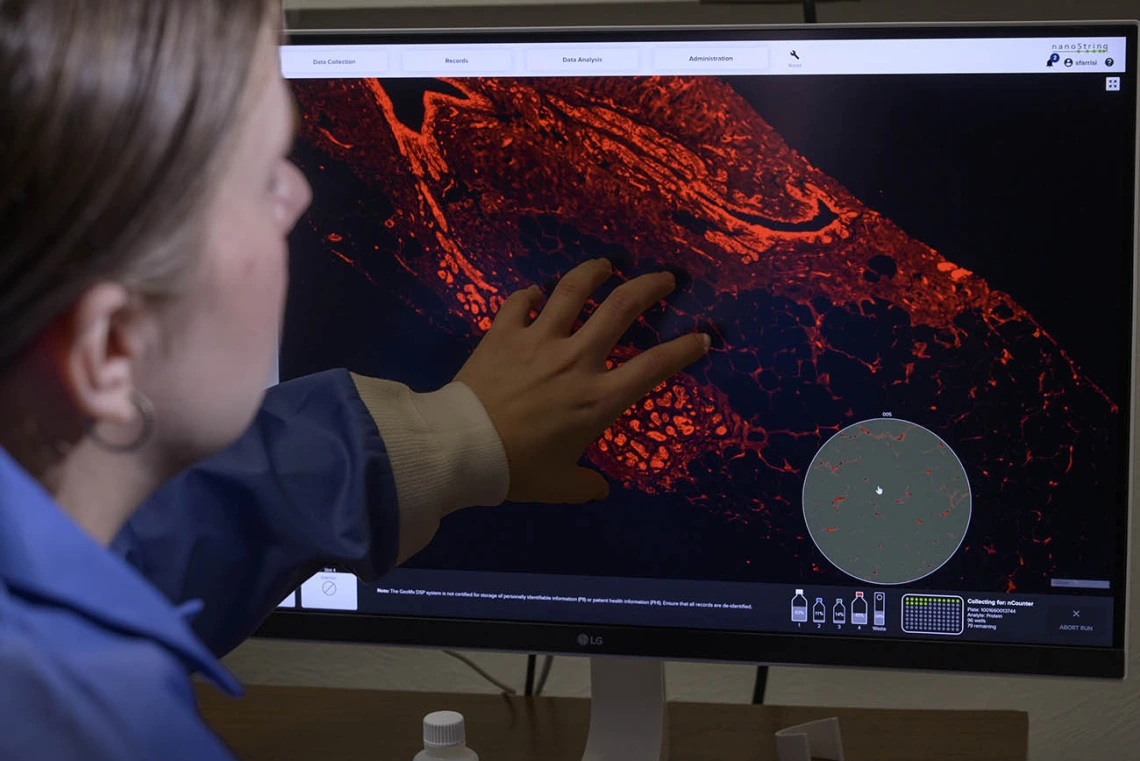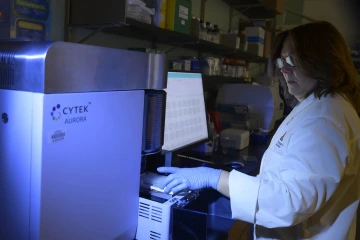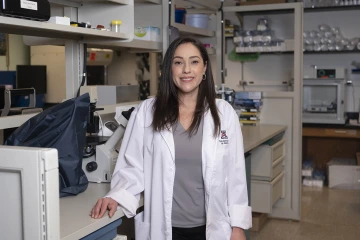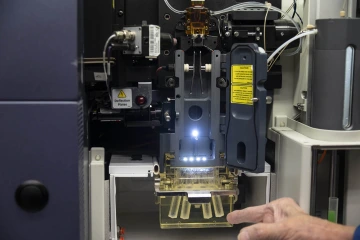Monitoring the immune system to unlock new treatments
A University of Arizona Health Sciences shared resource helps researchers advance their science by sorting and characterizing the immune system.

The Human Immune Monitoring Facility is a shared resource within the University of Arizona Cancer Center that provides comprehensive immune profiling, sample preparation and clinical trial support.
You cannot feel it, but your immune system is currently waging a war against infection, cancer and other diseases. In fact, a vast network of organs, white blood cells, antibodies and chemicals are fighting microscopic battles every minute of every day. The army is often victorious. For example, it usually clears abnormal cells before they become cancerous. However, there are also many ways the system can fail, be defeated or even turn against our own bodies.

The Flow Cytometry and Human Immune Monitoring Shared Resource employs several techniques and technologies to shed light on immune system components and their interactions. Their services include multispectral flow cytometry, metabolic analysis and serum or plasma extraction.
As researchers work to harness the power of the immune system to fight conditions such as cancer and to understand how to control autoimmune diseases including diabetes, many labs can benefit from specialized support. The Flow Cytometry and Human Immune Monitoring Shared Resource located in the UArizona Cancer Center can help provide highly sophisticated and detailed characterization of the immune system.
“Truly understanding the immune system is not only powerful; it is critical,” said Sara Centuori, PhD, director of the shared resource and research assistant professor of medicine at the College of Medicine – Tucson. “Immune profiling is at the forefront of understanding why diseases affect who they affect, the way they behave, and why some therapeutics work for some people but don’t for others.”
Categorizing the vast and complex immune system

Sara Centuori, PhD, is the director of the Flow Cytometry and Immune Monitoring Shared Resource and a research assistant professor of medicine. Her research focuses on the identification of novel immunomodulatory agents for the prevention and treatment of cancer.
In flow cytometry, colored, fluorescent molecules are attached to antibodies directed at specific cell markers so that specific cell populations can be easily characterized. This allows scientists to see the different immune cells at work and possibly track what interactions are happening.
“It is important to not only study the pathogens that might do us harm, but also to understand our body’s own defense systems,” said Janko Nikolich, MD, PhD, head of the UArizona College of Medicine – Tucson’s Department of Immunobiology and the UArizona Health Sciences’ Personalized Defense initiative, which helps fund the Flow Cytometry and Humane Immune Monitoring Shared Resource. “Deeper knowledge of the immune system is critical to advancing science and medicine and is key to new treatments that will prevent and cure not only acute infectious diseases, but also cancer and chronic diseases such as arthritis, diabetes and many others.”
"Deeper knowledge of the immune system is critical to advancing science and medicine."
–Janko Nikolich, MD, PhD
While some flow cytometry labs can only look at about a dozen interactions, the full spectrum flow cytometer used in Dr. Centuori’s shared resource allows her team to look at 45 different cellular markers in one sample.
“If you are limited to 10 markers for example, the complexity of the information will never be as high-level as the immune system itself,” said Dr. Centuori, who is a member of the UArizona Cancer Center. “We can detect the full color spectrum beyond the naked eye and even beyond the UV channel. Right now, we are only limited by the number of colored dyes that are available for purchase.”
Stopping cancer from spreading
William Montfort, PhD, professor in the shared College of Science/College of Medicine – Tucson’s Department of Chemistry and Biochemistry, is one of the researchers utilizing immune monitoring and flow cytometry. His Native American Cancer Prevention research includes investigating new therapies for triple-negative breast cancer.

William Montfort, PhD, is a professor in the shared College of Science/College of Medicine – Tucson’s Department of Chemistry and Biochemistry. Much of his work revolves around the atomic structure of proteins while also addressing questions important to human health.
“Triple-negative breast cancer is an aggressive disease that is negative for three common drivers of breast cancer and does not respond to existing medications. It has also been shown to be even more lethal in Native American populations,” said Dr. Montfort, director of the Biological Chemistry Graduate Program and former co-leader of the Clinical and Translational Oncology Program at the UArizona Cancer Center. “Currently, chemotherapy is the only treatment option.”
Dr. Montfort is working with Dr. Centuori’s team to examine how nitric oxide, a molecule found in almost every cell in the human body, could potentially unlock new and more targeted treatments for triple-negative breast cancer.
Healthy immune systems use nitric oxide to suppress tumor growth. In tumor cells, however, nitric oxide appears to help activate the mechanisms that lead to cells growing and spreading, Dr. Montfort explained. To better understand this dynamic, he set up an experiment where researchers could eliminate the gene in the tumor that generates nitric oxide.
“Triple-negative breast cancer spreads more quickly than other breast cancers. When it gets into the lungs and other organs it is more difficult to treat,” Dr. Montfort said. “But when we knocked out the gene that generates nitric oxide, the tumor no longer spread to the lungs.”
The finding led Dr. Montfort to his current investigation exploring two different drug therapies. He hypothesizes that these therapies may be able to manipulate nitric oxide levels and potentially spur immune cells within the tumor to come to life and clear the cancer away. Dr. Centuori’s team is helping identify the outcomes by teasing apart the tumor’s cells to determine its immune profile.
Advancing science in other areas
The Flow Cytometry and Human Immune Monitoring Shared Resource is being utilized in many other research projects, including data analysis for a clinical trial run by former UArizona Cancer Center researcher Julie Bauman, MD. That project is cataloging the differences in the immune systems of responders and non-responders from a recently completed phase II clinical trial conducted at the University of Arizona Cancer Center in head-and-neck cancer using the monoclonal antibody ficlatuzumab. All of the trial’s participants had exhausted all other treatment options and were considered terminally ill.

Flow cytometry is a powerful tool that measures the functional and structural characteristics of mixtures of cells based on their ability to scatter light.
“At the end of the trial, two of the participants had completely cleared their cancer, four participants had partial responses and for some there was no response,” Dr. Centuori said. “Preliminary evidence suggests the patient’s baseline immune system characteristics may provide clues to understanding the efficacy of the treatment.”
Dr. Centuori’s team is working using multiple technologies to evaluate various sample types taken before treatment to determine exactly what the immune system was doing in each participant before they began treatment and how that may be associated with therapeutic response.
“We are using cutting-edge technologies to characterize and understand the spatial relationships between immune cell populations and the tumor microenvironment. Specifically, we are interested in which signatures are correlated with a negative response or a positive response.” Dr. Centuori said. “So, we are trying to put those pieces of the puzzle together."
For Montfort, the shared resource highlights what he calls the beauty of academic science.
“I’m not an immunologist; I’m a biochemist. I spend most of my time thinking about where atoms are in proteins, but I have some ideas on a cancer connection. I would never be able to get all of these techniques up in my own laboratory,” he said. “Now, I can ask my questions, with highly sophisticated equipment and well-trained personnel, and push my science forward.”
Our Experts
Sara Centuori, PhD
Research Assistant Professor, Medicine
Director, Flow Cytometry and Immune Monitoring Shared Resource
Member, Cancer Prevention and Control Program, UArizona Cancer Center
Member, Aegis Consortium
Janko Nikolich, MD, PhD
Professor and Head, Department of Immunobiology, College of Medicine – Tucson
Co-Director, Arizona Center on Aging
Director, AEGIS Consortium
Professor, Medicine
Professor, Nutritional Sciences
Member, BIO5 Institute
Member, Cancer Biology Program, UArizona Cancer Center
William Montfort, PhD
Professor, Chemistry and Biochemistry-Sci
Member, BIO5 Institute
Professor, Molecular and Cellular Biology
Director, Biological Chemistry Graduate Program, UArizona Cancer Center
Contact
Brian Brennan
Health Sciences Office of Communications
520-621-3510
brianbrennan@arizona.edu

